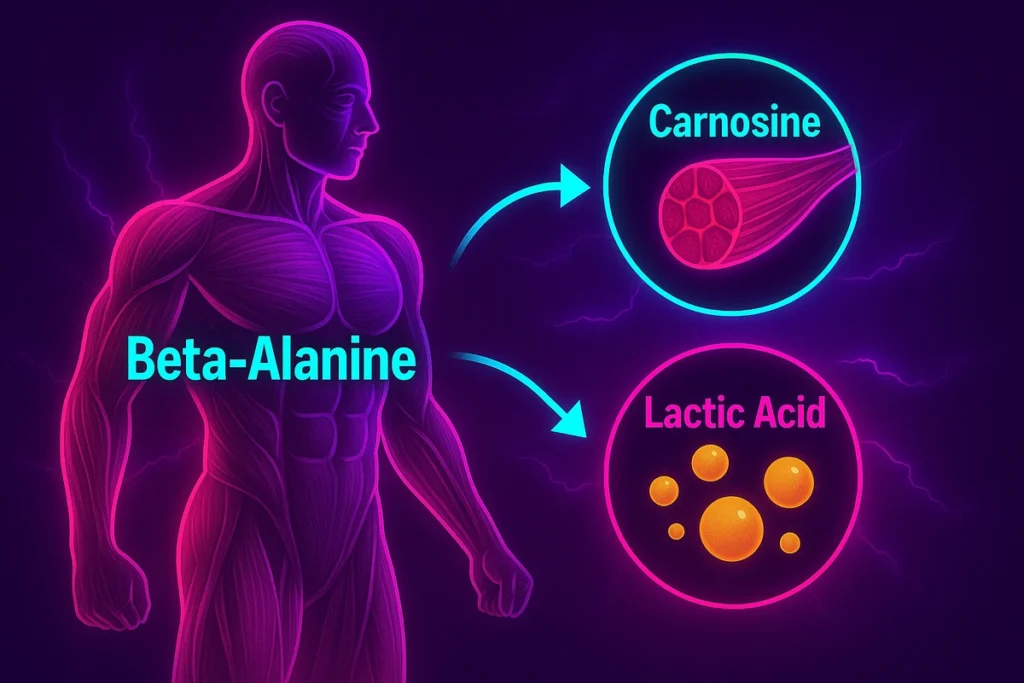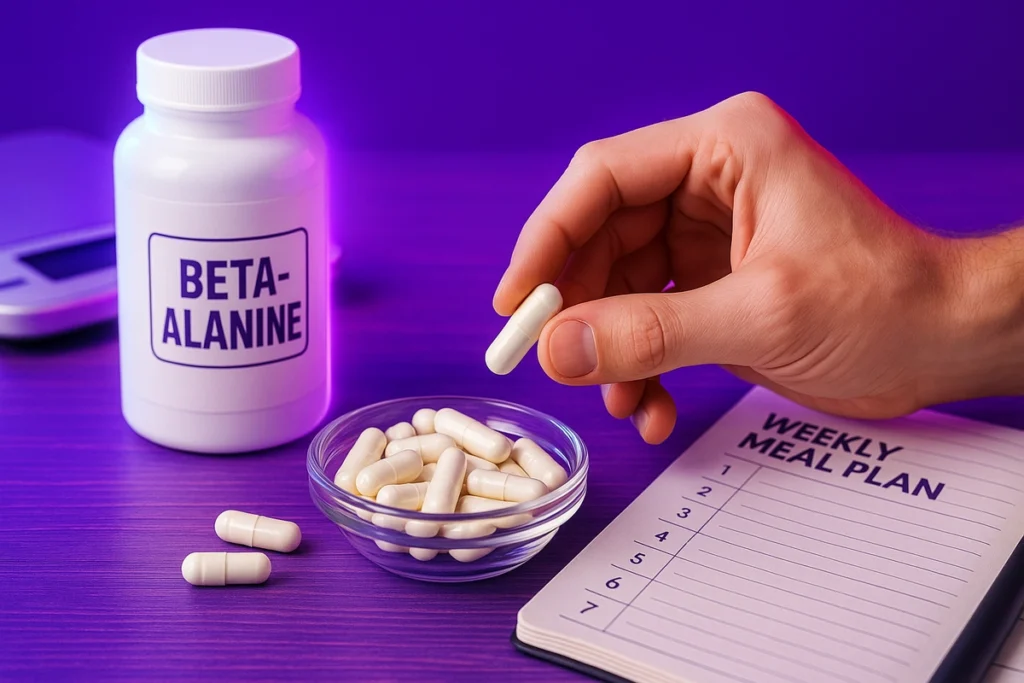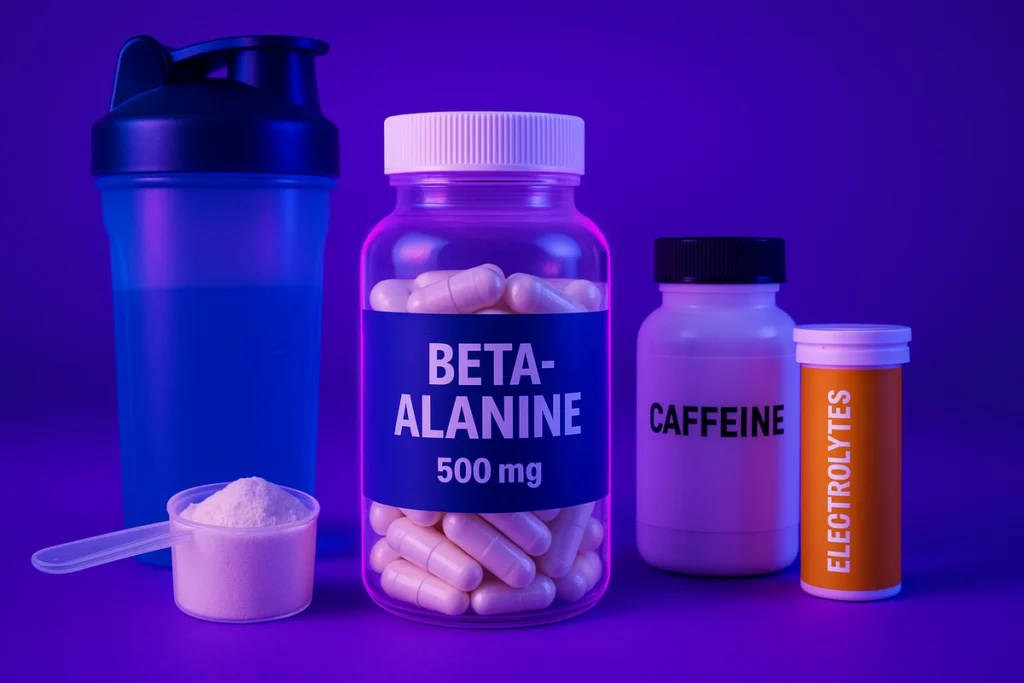Struggling to push through the final stretch of your runs? Feel like your legs burn out just when you need that last burst of power?
Beta-alanine might be the endurance booster you’ve been missing.
Used by elite runners, cyclists, and even obstacle course racers, this supplement helps buffer lactic acid and delay muscle fatigue—so you can hold your pace longer and finish stronger.
In this article, I’ll break down exactly how beta-alanine works for runners, how to use it, and whether it’s worth adding to your endurance stack.
You’ll also hear real stories from clients I’ve coached who’ve used it to level up their performance.
Table of contents
- Does Beta-Alanine Really Help Runners and Endurance Athletes?
- What Is Beta-Alanine and How Does It Work?
- Why Runners Should Consider Beta-Alanine
- How to Take Beta-Alanine for Endurance
- Side Effects and How to Manage Them
- Stacking Beta-Alanine with Other Endurance Supplements
- Real Results: What Runners Say About Beta-Alanine
- Final Verdict: Is Beta-Alanine Worth It for Runners?
Does Beta-Alanine Really Help Runners and Endurance Athletes?

Yes—it absolutely can.
As a coach who primarily trains strength athletes but also works with endurance clients, I’ve seen beta-alanine improve performance in real time.
It helps delay muscle fatigue, especially during high-effort runs in the 1 to 10-minute range. That’s the sweet spot where lactic acid starts to build up and legs begin to burn.
One of my clients, Marco from Italy, added beta-alanine to his 10K prep and noticed he could push harder in the final kilometers.
For me, during a conditioning phase with sprint intervals, it helped keep my legs from giving out midway through high-intensity rounds.
For more insight, check out this detailed beta-alanine results timeline.
What Is Beta-Alanine and How Does It Work?

Beta-alanine is a non-essential amino acid that raises carnosine levels in your muscles.
Carnosine acts like a buffer—it neutralizes the acid that builds up during intense exercise, allowing you to sustain high effort longer.
It’s not an instant boost like caffeine, but with consistent daily intake over a few weeks, it helps you grind out more reps, more meters, more time at threshold pace.
Read more on how beta-alanine works and why timing matters less than consistency.
Why Runners Should Consider Beta-Alanine

If you’re running middle-distance events like the 800m, 1500m, or even up to the 10K, beta-alanine can help you stay stronger in the final stretch.
That burning feeling in your legs? Beta-alanine helps delay that.
Aisha, one of my clients from Dubai, trains for obstacle course races. After three weeks on beta-alanine, she told me she was recovering faster between high-intensity intervals—and finishing stronger.
If you’re pushing pace in interval sessions or fighting to hold speed during the last third of a race, this supplement can make a difference.
And yes, it’s a solid option for both men and women. I’ve covered this more in my beta-alanine guide for women.
How to Take Beta-Alanine for Endurance

Here’s what works best in my experience:
- Loading phase: Take 3.2 to 4 grams daily for at least 4 weeks.
- Split the dose: Take it in two smaller servings to avoid side effects.
- Consistency matters: It’s not about timing—just get it in daily.
Some athletes prefer to avoid caffeine while loading. In that case, try these caffeine-free beta-alanine supplements.
And if you’re unsure how to begin, use this step-by-step loading guide.
Side Effects and How to Manage Them

The most common side effect? Tingling—called paresthesia.
I felt it myself early on, especially in the face and hands. Most of my clients feel it too in the first couple of weeks.
The fix? Take smaller doses with food and split your intake throughout the day. The sensation fades over time and doesn’t mean anything dangerous is happening.
To better understand and manage this, read my breakdown on beta-alanine tingling.
Stacking Beta-Alanine with Other Endurance Supplements

Beta-alanine works even better when stacked right.
I often pair it with:
- Creatine monohydrate – for strength-endurance and muscle preservation.
- Caffeine – pre-run for alertness and a mental boost.
- Electrolytes – especially for long runs or sessions in the heat.
My preferred combo is the creatine and beta-alanine stack. It’s been a game-changer for hybrid athletes.
Real Results: What Runners Say About Beta-Alanine

The feedback I get is often the same:
“I can push longer,” or “My legs didn’t give out as fast.”
It’s not just about raw speed—it’s about holding your form and power deeper into the run.
That’s what Marco and Aisha experienced. That’s what I felt in my own sprint conditioning blocks.
If you’re still wondering when to take it, I’ve written about the best time to take beta-alanine and why timing is less important than consistency.
Final Verdict: Is Beta-Alanine Worth It for Runners?

If you’re a serious runner looking to push your limits, beta-alanine is worth considering.
It’s not essential—but it’s a solid performance enhancer, especially for middle-distance and endurance athletes training at high intensities.
Stick with it consistently. Use it smart. And when you’re grinding through that last rep or final kilometer, you’ll feel the edge.
Coach’s Tip:
Don’t just rely on supplements. Dial in your training, eat smart, hydrate well—and then let beta-alanine be the cherry on top of your endurance game.



Leave a Reply